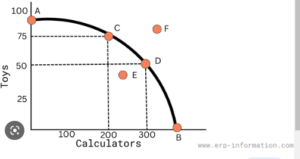Economics is all about trade-offs or opportunity costs that help us make decisions about what we need to give up in order to get something. We can demonstrate these through models which are a simplified representation of reality. Economic models can be worth a lot of money. They can be developed to help governments make policy decisions or purely scientific purposes. Consulting firms also use models to predict future trends or provide advice.
Two important models are the production possibilities frontier and comparative advantage. The production possibility frontier demonstrates in a simplified economy trade-offs in producing 2 separate goods. This simplification helps us graph the trade off. For example:

This graph shows the tradeoff of calculators to toys. The idea is to find the best mix to create the most of each. The graph also shows us how specialization can increase productivity and how comparative advantage between two specialists can increase productivity overall.
Efficiency is an important economic concept. An efficient economy means that there’s no missed opportunities and no way to make someone better off without making others worse off. The economy must be both efficient in production and efficient in allocation. Resources must be allocated efficiently so that consumers are as well off as possible in addition to maximizing its productive output.
